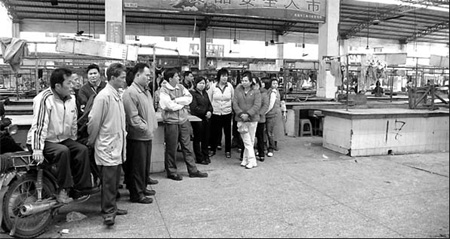Pork retailers in 6th day of strike
Pork sellers in Gaobu town of Dongguan City of Guangdong Province went into the sixth day of their strike yesterday to protest the government-backed monopoly of pork.
Town government officials continued to neglect the requests of the group while reiterating that the market supply of fresh pork is back to normal.
"There has been just a small group of pork retailers who stopped doing business, which should not affect the general market order at all," a director surnamed Mo with the economic and trade office of Gaobu told China Daily.
 |
|
Pork sellers in Xinlian market of Gaobu town, Dongguan, during a strike on Tuesday. [China Daily] |
However, all of the 60-plus pork shops in the Xinlian market, the largest wet market supplying fresh pork in the town, were closed, with at least 20 operators standing quietly beside empty stalls.
Only one temporary stall, which was arranged by the government, sold fresh pork.
The situation was the same in the First market, which is located on the other side of the street and about 1 km away from the town government building.
"We are losing money after the government contracted the supply of live pigs to only one wholesaler from the previous four starting from this year," said a dealer, who tried to protect himself from any revenge by giving only a surname of Chen.
The final winner of the public bid, which attracted about 20 wholesalers in late December, agreed to pay 5.8 million yuan (US$850,000) annually to the government, from the starting price of 1.8 million yuan, for the monopolized right, according to the pork retailers.
When it became effective on Jan 1, the pork retailers discovered that the wholesale price for a live pig was raised from 13.2 yuan per kg to 14.4 yuan. This means that they would have to pay 120 yuan more for a pig that weighs 100 kg, for example.
They are allowed to pick up pigs from their familiar pig farms, rather than buying the live pigs directly from the wholesaler, but have to pay at least 75 yuan each to the sole supplier.
"We could make a profit of just about 30 yuan from a pig. How can we support the business with a sharp increase of cost now?" Chen asked.
The pork retailers cannot transfer the burden to the consumer by increasing the retailing prices, given the relatively weak buying power of the local residents, a majority of whom are migrant laborers with meager incomes, he added.
The retailers also expressed concerns that the sole supplier would further increase the costs. They appealed for a talk with town government officials and requested that they diversify the live pig suppliers like before. If not, they said, the strike will go on.
However, town officials insisted that the centralization of the supply is good for food safety.
"The government will put the situation completely under control with only one supplier," Mo said. "The move aims at improving pork quality and safety."
The supplier has been under the strike supervision of the government and so far the authorities has not found any abnormal price hike, he said.
Since pork is a major food for Chinese people, especially during the holidays, the local residents in the town of 140,000 expressed strong dissatisfaction about the supply shortage.
"There is only one shop working today and the price is expensive," said an entertainment shop operator living near the Xinlian market from Chongqing municipality. He was annoyed by the strike because he had planned to make a large quantity of pork sausage for the coming Lunar New Year.
"The government must do something to solve the problem, or the residents will suffer a big inconvenience," he told China Daily.
 0 Comments
0 Comments







Go to ForumComments